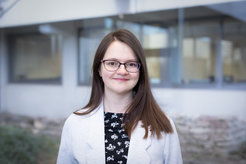New Research Group Leader at the MPI of Biochemistry
Maria Sokolova will become Lise Meitner Research Group Leader at the Max Planck Institute of Biochemistry starting March 1, 2024.
Starting March 1, 2024, Dr. Maria Sokolova will investigate the mechanisms of transcription by phage RNA polymerases in her Lise Meitner Research Group Bacteriophages at the Max Planck Institute (MPI) of Biochemistry. Bacteriophages, or phages for short, are viruses that infect bacteria. Investigating an enzyme called RNA polymerase in phages promises the further improvement and development of novel tools in mRNA vaccine production and other biotechnological applications.
“We are excited to welcome Maria to our institute, further extending our research into the field of bacteriophages. There are many interesting collaborations ahead of us, that I am really looking forward to”, says the managing director of the MPI of Biochemistry, Dr. John Briggs.
The Research Group Bacteriophages
Maria Sokolova's research group will focus on studying bacterial viruses known as bacteriophages. These are viruses that exclusively infect bacteria. They are the most abundant and diverse biological entity on our planet.
Many essential enzymes, such as RNA polymerases, are conserved in cellular organisms ranging from bacteria to humans. However, the situation is markedly different for phages, where RNA polymerases exhibit unique properties that are absent in their conserved cellular counterparts. Investigating such differences opens up opportunities for new biotechnological tools and valuable insights into evolution. The study of phage RNA polymerases also has promising implications for developing novel tools in mRNA vaccine creation.
"Phages evolve quickly and 'invent' peculiar things that can be used in biotechnology. The primary focus of my research is studying unusual phage RNA polymerases, but we will go beyond transcription and will study other interesting aspects of phage-host interactions by applying techniques which have not been yet applied for phages, such as Cryo-electron tomography and whole-cell cross-linking mass spectrometry. I am excited to join the MPI of Biochemistry and looking forward to all the potential collaborations," concludes Maria Sokolova.

About Maria Sokolova
Maria Sokolova studied biophysics at the Peter the Great Polytechnic University in St. Petersburg, Russia, and completed her PhD in molecular biology at the Skolkovo Institute of Science and Technology, Skoltech for short, in Moscow, Russia, in 2018. In 2017 she was also working as a pre-doctoral fellow at the University of Texas Medical Branch in Galveston, Texas. While she was subsequently an assistant professor in the Center of Life Sciences at Skoltech from 2019 to 2022, Maria was also a postdoctoral fellow in the lab of Petr Leiman at the University of Texas Medical Branch in 2019. From August 2022 until March this year, she worked as a PostDoc under the current President of the Max Planck Society Patrick Cramer at the MPI for Multidisciplinary Sciences in Göttingen. Starting March 2024 she is Lise Meitner Research Group Leader for Bacteriophages at the MPI of Biochemistry.
[tb]
Dictionary of the Research Group Bacteriophages:
Bacteriophages/Phages: Bacteriophages, or phages for short, are viruses that only infect bacteria.
conserved: In biology, genes are said to be conserved if they have not changed in the course of evolution or, in other words, over many generations.
RNA polymerases: RNA polymerases are crucially involved in transcribing our DNA into RNA strands in order to transfer the genetic information further, for example in the form of mRNA.
enzymes: Enzymes are small proteins that act as catalysts. This means that their involvement accelerates biological reactions without them changing themselves.
